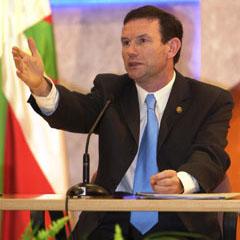
The Spanish Government, as was widely predicted, has sought a court order to prevent Basque people from deciding their political future through a referendum process, on the grounds that it is unconstitutional and therefore illegal.
Lawyers acting on behalf of Spanish Prime Minister Jose Luis Rodriguez Zapatero and his Government have asked the Spanish high courts to block the referendum, which is planned to take place on 25th October 2008 in the Basque autonomous region of the state of Spain. However the Basque Premier, Juan Jose Ibarretxe and his PNV nationalist Government, have said that the referendum is legal, because it is non binding. Nevertheless, Zapatero believes that the referendum is a veiled attempt to push towards independence.
In contrast, Ibarretxe argues that the referendum is part of a democratic consultation process to ask Basque residents what they want. The proposed referendum will ask two questions. The first question will ask if people want a "negotiated solution" to the Basque armed conflict, provided that ETA is willing to end violence, and the second question will ask if Basques want all political parties to work towards an agreement to decide the political future of the autonomous region, which will be put to a second referendum before 2010.
The decision by the Spanish courts to agree to investigate the legal status of the Basque referendum late last month, automatically suspends the law passed by the Basque Government to hold the referendum, for at least 5 months or until the 12 appointed Spanish judges decide whether it violates the Spanish Constitution. However, the Basque Government has already started the process of distributing the referendum ballot papers to voters. Basque nationalist critics of the referendum say that the wording of the referendum does not go far enough and without the participation of the other Basque provinces of Navarra and those in the French state, the vote is meaningless.
The action of the Spanish Government though highlights the lengths that European state Governments are prepared to go to, to prevent stateless nations from seeking self determination. The right of a nation to seek self determination (independence or greater political autonomy) is generally supported at an international level, as can be seen in the former soviet bloc countries and more recently in Montenegro and Kosovo. However Spain was one of a number of European states to oppose the independence of Kosovo, arguing that it could spur the independence movements in its own state.
It is still unknown how the British Government will react to the planned Scottish referendum on independence in 2010. It could well be that the saving grace of Scottish advocates of independence (and Welsh for that matter) is that there is no written British Constitution, as is the case in Spain. The 'European Constitution', in its Lisbon Treaty format, would have made it a lot more difficult for small nations like Scotland and Wales to seek self determination within the EU.
The Basque Governments' initiative to hold a referendum – regardless of its limitations should be applauded by those who believe in the democratic right of peoples to seek self determination, the principle of subsidiarity, political freedom and a more peaceful world in which to live.
J B Moffatt Director of Information Celtic League
07/08/08
- Emmanuel Grégoire et l’abbé Macron par David Grosclaude le 23/11/2024
- Pays de Redon. La Bogue d’or, rendez-vous du « génie populaire » par Le blog de paul Molac le 05/11/2024
- Catherine Vautrin en Corse : Régions et Peuples Solidaires appelle l’Etat à enfin aboutir sur l'autonomie par RPS le 25/10/2024
- Gouvernement Barnier : des nominations inquiétantes par RPS le 24/09/2024
- Quelle future gouvernance en France ? par Marcel Berrou le 08/07/2024
- Après deux cycles de trois ans du Parlement de Bretagne réveillé, voici venir le troisième cycle ! par KAD le 01/07/2024
- Résolution pour la Réunification de la Bretagne à la XIXème Assemblée Générale de l'UNPO à Munich, les 11 et 12 mai 2024 : par KAD le 07/05/2024
- TER Nouvelle Aquitaine : quelle honte ! par David Grosclaude le 18/04/2024
- Les Braises de la Rencontre, le 5 mai 2024, sur le parc de sculptures mémorial de MAB Koad Sav Pell ! par MAB, Musée Archipel Breton le 16/04/2024
- Koun Breizh s’indigne : Non ! les festoù-noz ne sont pas des lieux réservés aux « attardés » ! par Koun Breizh - Bertaign Tenant - Mémoire-de-Bretagne le 07/01/2024
 The Celtic League has branches in the six Celtic Countries. It works to promote cooperation between these countries and campaigns on a broad range of political, cultural and environmental matters. It highlights human rights abuse, monitors all military activity and focuses on socio-economic issues.
TEL (UK) 01624 877918
MOBILE (UK)07624 491609
(voir le site)
The Celtic League has branches in the six Celtic Countries. It works to promote cooperation between these countries and campaigns on a broad range of political, cultural and environmental matters. It highlights human rights abuse, monitors all military activity and focuses on socio-economic issues.
TEL (UK) 01624 877918
MOBILE (UK)07624 491609
(voir le site)
